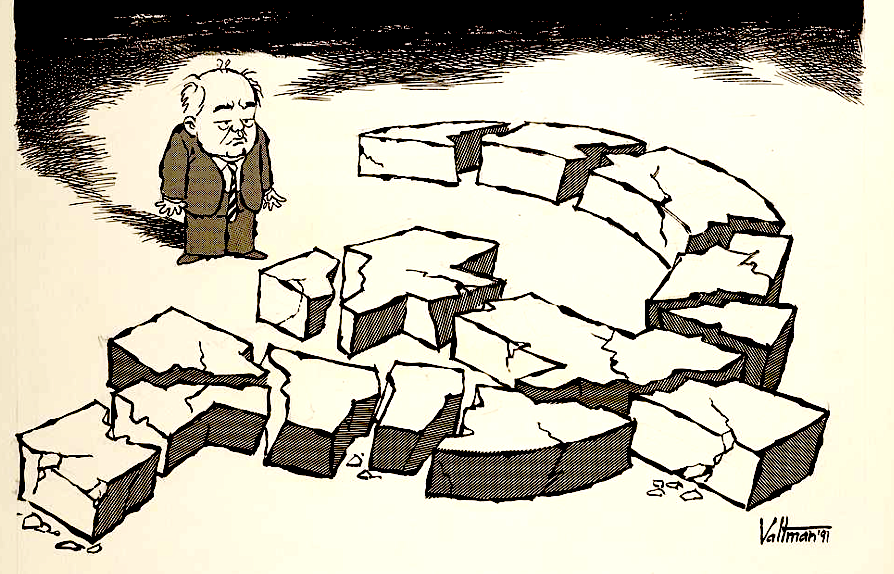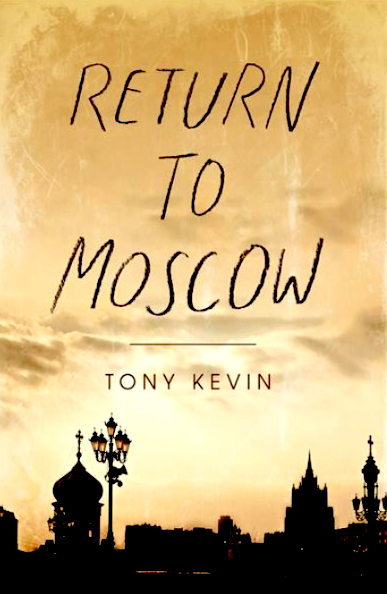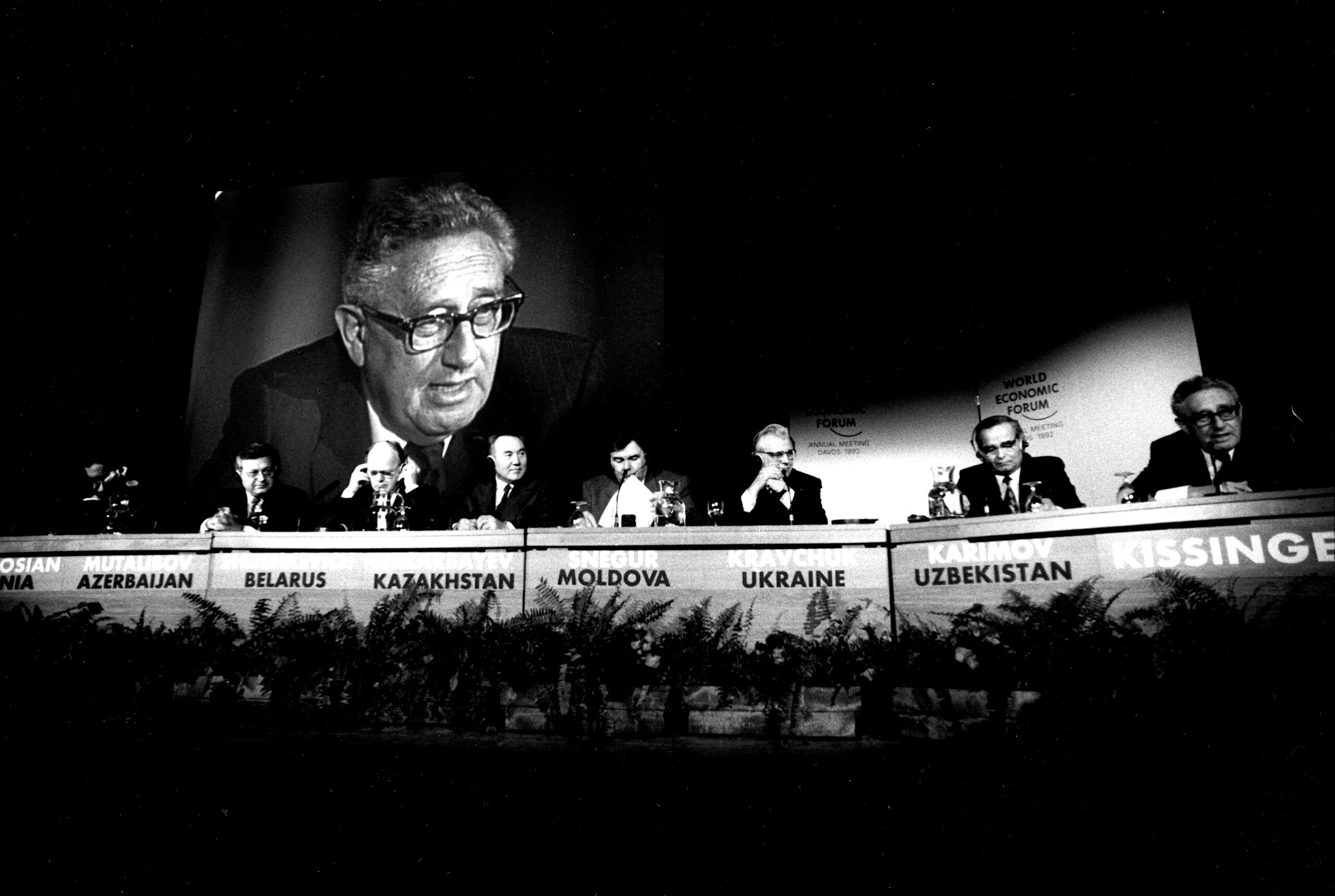There is an almost Shakespearean tragic quality about the late Soviet leader’s 1985-90 time in power, writes Tony Kevin. But Russian historians of the future may have reason to treat him kindly.

Edmund S. Valtman’s 1992 cartoon of Mikhail Gorbachev beholding a massive and shattered hammer and sickle. (Library of Congress)
By Tony Kevin
 To rise to the top of the Soviet political system from relatively humble beginnings in small-town southern Russia, as Mikhail Gorbachev did, required three elements: great personal strengths of intelligence, ambition and willpower; supreme belief in one’s own leadership ability and in one’s ability to convince others of this; and the essential third element of good luck. For most of his Soviet political career, Gorbachev rode the wave of success, drawing on all three attributes.
To rise to the top of the Soviet political system from relatively humble beginnings in small-town southern Russia, as Mikhail Gorbachev did, required three elements: great personal strengths of intelligence, ambition and willpower; supreme belief in one’s own leadership ability and in one’s ability to convince others of this; and the essential third element of good luck. For most of his Soviet political career, Gorbachev rode the wave of success, drawing on all three attributes.
It was no accident that when his uninspiring predecessor Konstantin Chernenko died in 1985 aged 73 after less than a year in office, Gorbachev was the unanimous choice of his Politburo colleagues to succeed him. He had already risen to prominence under Chernenko’s capable predecessor, Yuri Andropov (1983-94). Andropov had highly estimated Gorbachev as a cautious reformer, still a devout Communist believer, like Andropov himself, but with youth and energy on his side.
Gorbachev was only 54 when he became Soviet leader. He should have enjoyed years of successful leadership ahead of him. The Soviet system was still working well enough to sustain a credible nuclear second-strike deterrent against the United States. Its space program was equal to or ahead of the U.S. program. It enjoyed a lot of respect and affection in the nonaligned world through its reliable military and moral support for their anti-colonial struggles.
Things could have gone on like this for a long time. It is only the dubious wisdom of hindsight that says Gorbachev was doomed to fail and to bring down the Soviet Union.
His Nemesis
 Gorbachev’s nemesis was Boris Yeltsin, who typified the growing regional jealousies and burning personal ambitions becoming rife in the Soviet Communist Party in every Soviet Republic, including in the central Russian Federation. Yeltsin’s family background in Yekaterinburg — his family had suffered unfairly under Stalinism — left him with a well-concealed contempt for the Soviet system. Yeltsin did not believe, as Gorbachev did, in the New Soviet Man. He thought Russia was being exploited by the greedy smaller surrounding republics. Yeltsin believed only in Russia — and he plotted tirelessly to bring down Gorbachev and the Soviet system. The complex story is told in the early chapters of my 2017 book Return to Moscow.
Gorbachev’s nemesis was Boris Yeltsin, who typified the growing regional jealousies and burning personal ambitions becoming rife in the Soviet Communist Party in every Soviet Republic, including in the central Russian Federation. Yeltsin’s family background in Yekaterinburg — his family had suffered unfairly under Stalinism — left him with a well-concealed contempt for the Soviet system. Yeltsin did not believe, as Gorbachev did, in the New Soviet Man. He thought Russia was being exploited by the greedy smaller surrounding republics. Yeltsin believed only in Russia — and he plotted tirelessly to bring down Gorbachev and the Soviet system. The complex story is told in the early chapters of my 2017 book Return to Moscow.
In summary, Gorbachev’s supreme self-confidence and his belief in the strength of the Soviet system he headed — qualities that had brought him to the top in 1985 — proved inadequate to the challenges facing him in the next five years, when the third essential element — luck – ran out on him.
There is an almost Shakespearean tragic quality about his years in power 1985-90. In a sentence, his virtues became his vices. He consistently under-estimated the threat that Yeltsin’s narrow Russian nationalism represented, both to him personally as Soviet leader and to the whole Soviet system.
The second thing Gorbachev fatally underestimated was Western malevolence. He really came to believe that the United States of President Ronald Reagan was his friend. We know with hindsight that this was simply not true. When Reagan said “Mr. Gorbachev, tear down this wall,” his real meaning was “tear down your Soviet system.”
Gorbachev never really understood how Henry Kissinger (as secretary of state in President Richard Nixon’s years 1973-77) and Zbigniew Brzezinski (in the subsequent 1977-81 years of President Jimmy Carter) had been architects of a consistent bipartisan Washington elite policy. This policy was aimed at exploiting detente to weaken the Soviet Union, by persuading the naive and easily corrupted Russian elite that their country was actually second-rate and would always be an outlier of the glamorous West that seemed to do almost everything better than the Soviet Union.

Henry Kissinger, former U.S. secretary of state, chairing a “new partners” panel with former U.S.S.R. leaders in Davos, Switzerland, 1992. (World Economic Forum, CC BY-SA 2.0, Wikimedia Commons)
For years, this was the worm that was eating away from within the Soviet system, that seemed on the surface to be so strong and self-confident, right up until its final self-destruction. Gorbachev never understood, even in his long 32 years of retirement after 1990, why he had been unable to stop the rot.
Many older Russians will not easily forgive Gorbachev for the fatal mistakes he made in his years in power. They bitterly remember the horrible decade of crime and starvation and national humiliation that followed, truly a second Time of Troubles for Russia in 1990-99.
I think Russian historians of the future may be kinder to him. He humanised the Soviet system as symbolised in his well-known rehabilitation of dissident Andrei Sakharov. He gave a younger generation of Russians hope for a more democratic future. Those seeds have flourished in the new Russia.
He also presented to Russians a model of East-West detente that, for all its risks and dangers that we now better understand, held out hopes of a better more harmonious future for both East and West. It is not his fault that the Western power elite exploited his generosity of spirit.
It is a pity that Gorbachev never had President Vladimir Putin’s political shrewdness and understanding of the powerful forces arrayed against the Russian world, then and now.
Gorbachev and the much younger Putin might have found they had something in common, in their shared love and loyalty for the Russian world.
Where Putin sharply diverges from Gorbachev — and more resembles Yeltsin — is in Putin’s hatred and loathing of Soviet communism and how easily it became corrupted and self-destructive under the Western ideological onslaught on the Russian world. That attack — initiated by Kissinger and Brzezinski —now has a malign life of its own.
Tony Kevin is a former Australian senior diplomat, having served as ambassador to Cambodia and Poland, as well as being posted to Australia’s embassy in Moscow. He is the author of six published books on public policy and international relations.
The views expressed are solely those of the author and may or may not reflect those of Consortium News.
Donate Today to CN’s
2022 Fall Fund Drive
Donate securely by credit card or check by clicking the red button:

A rather good write-up by Kevin giving the “luck” dimension to Gorbachev’s rise, power, program and legacy. While there are some luck involved but this is not overwhelmingly true. Most things about Gorbachev is in fact highly pre-planned but some of it got subverted at mid’course. The final one being his mourning period being unwittingly being unluckily upstaged by the demise of Queen Elizebeth II !
As ever, most enlightening, Ambassador Kevin. You, John Pilger, and of course Julian Assange do Australia proud in the tradition of Wilfred Burchett.
I think this is an unusually clear-eyed look at how things went from Gorbachev to Putin. Just add that Putin did the one thing the West cannot tolerate: He said, “No.” He decided that Russia would not become another Western puppet state.
Looking at Americans’ malevolence, from the outside, is always an eye opener, something too many Americans are still not prepared to address, let alone give credence to.
“Gorbachev never really understood how Henry Kissinger (as secretary of state in President Richard Nixon’s years 1973-77) and Zbigniew Brzezinski (in the subsequent 1977-81 years of President Jimmy Carter) had been architects of a consistent bipartisan Washington elite policy. This policy was aimed at exploiting détente to weaken the Soviet Union, by persuading the naïve and easily corrupted Russian elite that their country was actually second-rate and would always be an outlier of the glamorous West that seemed to do almost everything better than the Soviet Union.
“Many older Russians will not easily forgive Gorbachev for the fatal mistakes he made in his years in power. They bitterly remember the horrible decade of crime and starvation and national humiliation that followed, truly a second Time of Troubles for Russia in 1990-99.”
And who was standing on the sidelines egging the Yeltsin cohort on?
Who has been on the sidelines in Ukraine, with the same policy agenda, for Russia, since at least 2014, egging the plunder, corruption and destabilization on?
Two alone of all the inane questions possible!
Gorby was a naive nitwit.
The fall of the Soviet Union was one of the biggest global calamities to hit the world during the past 80 years. With no USSR as a counterweight, it allowed the Washington neocon-Ziocon militarist sociopaths to really take the gloves off and sock it to both the rest of the world and the domestic U.S. working population.
Gorby got rolled.
I think the US/UK greatly under-estimate today’s Russia.
You got that exactly reversed. Gorby and other Russian “glasnost” and “perestroika” champions apparently had no idea and certainly underestimated that the Washington militarist empire plays for keeps and would soon encroach all over the globe, including on Russia’s borders.
The U.S. and NATO did indeed underestimate Russia in one regard: its ability to bounce back from the exploitative shock therapy imposed on it by the exploiters of parasitic international finance.
I agree with both your comments here, D.H.Fabian . Thank you. Tony Kevin
And Gorbachev said something quite similar, albeit more diplomatically! (I appreciate non-diplomacy.)
And I’m not quite sure about the author’s characterization of Putin as an extreme anti-communist. When the Russians have liberated Ukrainian towns and cities, you see a lot of red flags! And the second largest party in Russia is the Communist Party. I think Putin is a lot more sophisticated than Gorbachev was and knows more about playing the political game. As Diana Johnstone said, oftentimes intelligence professionals were very well-educated regarding world affairs.
I agree with most of this . I discuss Putin’s relationship to the communist period and to Stalinism in my book Return to Moscow, still available through major online retailers . On the flags, many of the red flags we see being waved when Ukrainian towns are liberated by Russian forces are in fact replicas of the Red Army regimental flag waved over liberated Berlin in 1945 . It is coloured red and includes the hammer and sickle, but more besides . Look it up. It makes a statement about How pro-Moscow Ukrainians see the Zelensky Kiev regime , not about communism , in my view .